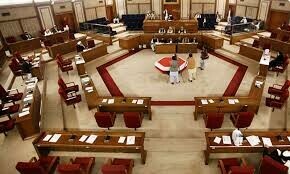ISLAMABAD: Reversing an earlier decision of the federal cabinet, the Economic Coordination Committee (ECC) of the Cabinet on Monday ordered continuous supply of gas to Punjab-based two fertiliser plants at existing rate of Rs1,597 per million British thermal unit (mmBtu) until Sept 30 and shift more than Rs15bn of its financial impact to other consumers.
“The proposal of the Ministry of Industries & Production to allow SNGPL-based plants to operate for a period of 6 months starting from March 31 till Sept 30 was approved by the committee, to ensure smooth supply of urea fertiliser for kharif season”, said an official statement after the ECC meeting presided over by Finance Minister Muhammad Aurangzeb.
The financial impact of Rs15-17bn, depending on actual supply, would be built into the gas price for domestic consumers, although it has recently been disallowed by the Oil & Gas Regulatory Authority (Ogra) in its determinations for revenue requirements of gas utilities for next fiscal year.
The latest summary to the ECC required that “SNGPL based plants i.e. FatimaFert (Sheikhupura) and Agritech may be allowed to operate beyond March 31, 2024 for six months till September 30th, 2024 at Ogra notified prices i.e. Rs1597 per mmBtu (feed and fuel) and any differential of gas price with RLNG for such supply be treated as RLNG diversion to domestic sector for recovery through SNGPL’s revenue requirements”. It also required a direction to the “petroleum division to ensure that maximum gas pressure/volume be provided to Fauji Fertilizer Bin Qasim Limited”.
Rs17bn financial impact to be passed on to domestic gas consumers
Earlier, the government had decided recently to end subsidy on gas supply to fertiliser plants. The federal cabinet has “reached the unanimous conclusion that gas to fertiliser plants should be supplied at full price, rather than subsidised rates”, according to minutes of the cabinet meeting.
At present, gas price for fertiliser stands at Rs1,597 per mmBtu although it was increased substantially in February this year but still contained about Rs217 per mmBtu subsidy. Under the cabinet decision, the government was to increase it to Rs1,814 per mmBtu.
The cabinet minutes noted that Ministry of Industries and Production had suggested direct provision of subsidies to farmers, claiming that “the benefits of subsidised gas to fertiliser plants had not trickled down to farmers, which was evident from the absence of any corresponding decrease in the price of urea and the distortion in the pricing of gas for fertiliser sector should be removed”.
The Ministry of Finance also did not support the provision of further subsidy on gas to meet the resultant price differential as the Ministry of Petroleum was of the view that in case of provision of gas to fertiliser plants at Ogra-notified price, the price differential would either have to be borne by the domestic consumers or must be subsidised by the Ministry of Finance.
A senior official said the publication of cabinet decision created ripples in the influential fertiliser and agriculture lobby that swung into action immediately and utilized every available forum including the prime minister who constituted a committee on fertiliser supply and pricing issues, leading to the modification of the Cabinet decision by its subordinate committee. The fertiliser producers have now promised to ensure sufficient urea so that there would be no need for imports and foreign exchange loss. The fertiliser companies have been holding back payments of more than Rs400bn collected from consumers under gas infrastructure development cess for more than five years now.
Another senior official, however, claimed that the “minutes of the federal cabinet had been recorded incorrectly and were in the process of rectification”. He said the cabinet decision was “futuristic in nature and not for immediate implementation”. To support this stance, he showed the latest summary presented to the ECC directly on the table on Monday without on agenda and with special permission of the ‘chair’, instead of prior circulation as was the case with five other summaries or agenda items.
The summary for the ECC suggested the ECC had previously allowed operations of two SNGPL-based plants (Fatima and Agritech) for January to March period. Subsequently, the Fertiliser Review Committee had recommended these operations be continued beyond March 31.
Published in Dawn, May 28th, 2024















































Dear visitor, the comments section is undergoing an overhaul and will return soon.